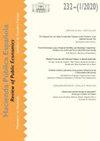A Revenue-raising Government Taxing a Firm with Private Information
IF 0.5
4区 经济学
Q3 ECONOMICS
Hacienda Publica Espanola-Review of Public Economics
Pub Date : 2012-01-01
DOI:10.7866/HPE-RPE.12.4.3
引用次数: 0
Abstract
This paper examines, for a two-period signalling game played by a revenue-raising government and a monopolistic firm in an asymmetric information context, how the government behaves when it taxes the firm’s production. Information regarding the firm’s efficiency (or its potential to pay taxes) is private; therefore, only the firm knows its ‘type’. To prevent opportunism and lead the firm to disclose information through its period-1 output, the period-1 per-unit tax needs to be lower than it would if information were perfect (and tax revenue is consequently lower). As a result, expected taxes increase with time. This behaviour generally (but not always) reduces social welfare. In contrast, when the government prefers the firm’s information is not disclosed by the period-1 signal, the expected per-unit tax in such period is the same as it would be if information were perfect. Moreover, if the firm reveals no information, then welfare is generally (but not always) greater than it would be if information were perfect. The government would generally prefer information not to be revealed, because disclose would greatly reduce its period-1 tax income. From a social standpoint, information non-disclosure increases welfare, except when both the probability of the firm being efficient and its efficiency level relative to that of the inefficient firm are sufficiently high. Clasificacion JEL: H21, D82.一个增加收入的政府对拥有私人信息的公司征税
本文考察了在信息不对称的情况下,政府对提高收入的政府和垄断企业进行的两期信号博弈中,政府对企业的产品征税时的行为。有关公司效率(或其纳税潜力)的信息是私有的;因此,只有公司知道它的“类型”。为了防止机会主义并导致公司通过第一时期的产出披露信息,第一时期的单位税收需要低于信息完美时的水平(因此税收收入更低)。因此,预期税收会随着时间的推移而增加。这种行为通常(但不总是)会减少社会福利。相反,当政府希望公司的信息不通过第一阶段信号披露时,该时期的预期单位税与信息完美时的预期单位税相同。此外,如果企业不披露任何信息,那么福利通常(但并不总是)比信息完备时的福利要大。政府通常希望信息不被披露,因为披露会大大减少其第一期税收收入。从社会的角度来看,信息不披露增加了福利,除非企业高效的概率和相对于低效企业的效率水平都足够高。JEL: H21, D82。
本文章由计算机程序翻译,如有差异,请以英文原文为准。
求助全文
约1分钟内获得全文
求助全文
来源期刊

Hacienda Publica Espanola-Review of Public Economics
Economics, Econometrics and Finance-Finance
CiteScore
0.90
自引率
14.30%
发文量
14
期刊介绍:
Hacienda Pública Española/Review of Public Economics welcomes submissions on all areas of public economics. We seek to publish original and innovative research, applied and theoretical, related to the economic analysis of Government intervention. For example, but not exclusively: Taxation, Redistribution, Health, Education, Pensions, Governance, Fiscal Policy and Fiscal Federalism.
In addition to regular submissions, the journal welcomes submissions of:
-Survey Reviews, containing surveys of the literature regarding issues of interest in the Public Economics field;
-Policy oriented reviews, showing the current contributions of Public Economics in relation to relevant contemporary issues affecting public decision-makers in the real world (Policy Watch);
-Comments of previously published articles. Contributions to this section should be limited to a maximum of 2 000 words (12 pages). If deemed adequate, the authors of the commented article will be given the opportunity to react in a Reply. Both Comment and Reply will be published together.
Articles for the Survey Reviews and Policy Watch section are subject to the same double blind reviwing procedure. The adequacy of Comments submitted for publication will be evaluated by the Executive Editors.
 求助内容:
求助内容: 应助结果提醒方式:
应助结果提醒方式:


